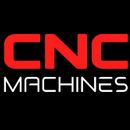7 Essential Tips for Discovering the Perfect CNC Machine

7 Essential Tips for Discovering the Perfect CNC Machine
Selecting the best CNC machine is a serious financial and time commitment. However, the overall benefits in terms of improved productivity, profitability, and increased product quality are well worth the investment. With the 4th Industrial Revolution expanding rapidly, manufacturers need to automate to stay competitive against rising cost. One of the most accessible and impact forms of automation is a CNC machine. Here are seven essential tips for selecting the perfect CNC machine.
1. Determine Your Factory Requirements
The type of CNC machine you need depends heavily on the nature of your work. Simple parts may only require a 3-axis CNC milling machine or CNC lathe. However, as complexity increases, it becomes more cost-effective to have CNC equipment that can machine most parts in one setup. For intricate and multi-axis machining, a 5-axis CNC machine might be the best choice. Specialized CNC machines, like Swiss lathes, are ideal for producing small, complex, cylindrical parts in large quantities.
2. Optimize CNC Machine Cost
Cost is a crucial factor when selecting CNC machines. They are generally more expensive than manual machines, and prices can vary significantly based on factors such as tooling, cooling systems, chip conveyors, bar feeders, and automatic tool changers. Only purchase the necessary add-ons to avoid unnecessary expenses. For example, if only small amounts of material are being removed, a chip conveyor may not be needed.
3. Plan CNC Machine Placement
CNC machines require significant space, especially with accessories like chip conveyors and tool changers. It's essential to plan ahead and consider the machine's weight. Large CNC machines are heavy and need a concrete floor designed to support their weight. Check your factory plans to ensure the foundation is strong enough for the CNC machine you intend to purchase.
4. Confirm CNC Power Requirements
CNC machines are power-hungry and often run on 3-phase power. Ensure that your building can supply enough power for the new CNC equipment. It’s also important to review current power consumption. While there may be enough power for existing machines, adding a new CNC machine might exceed the available power capacity.
5. Ensure Spare Parts Availability
Regular maintenance is crucial for CNC machines to operate optimally. Select a CNC machine with local technical support that stocks commonly needed spare parts. This is vital for minimizing downtime in case of a breakdown. Reliable and accessible technical support can save significant time and money, making it a worthwhile consideration when selecting CNC machines.
6. Define the Materials Being Machined
The materials you plan to machine significantly influence your choice of CNC machine. Hard superalloys like Inconel require advanced CNC machines with sufficient stiffness for accurate machining. If you’re working with softer materials like aluminum or mild steel, you can opt for less expensive CNC machines that still maintain the required tolerances.
7. Evaluate CNC Control Systems
Understanding the control system of a CNC machine is crucial. CNC machines come with factory-installed control systems such as Fanuc, Haas, and Heidenhain. While most manufacturers decide on the control system, some offer multiple options. Haas controls are user-friendly, whereas Fanuc systems are more complex but feature-rich. Choose a control system that fits your operators' skill levels and production needs.
Selecting the right CNC machine is a significant investment, but the benefits in productivity, profitability, and product quality make it worthwhile. By considering these seven tips, you can make an informed decision and ensure that your CNC machine meets your manufacturing needs and supports your business growth.



